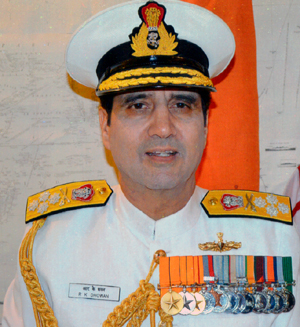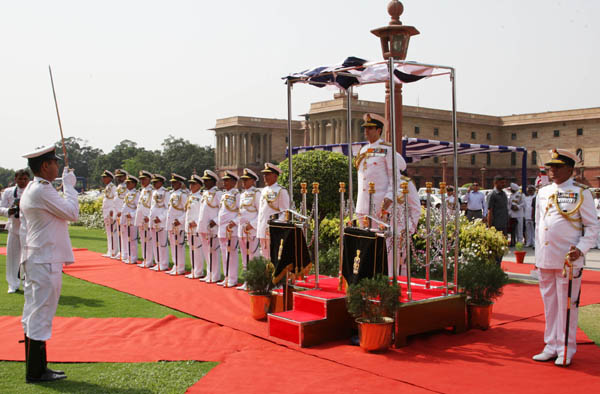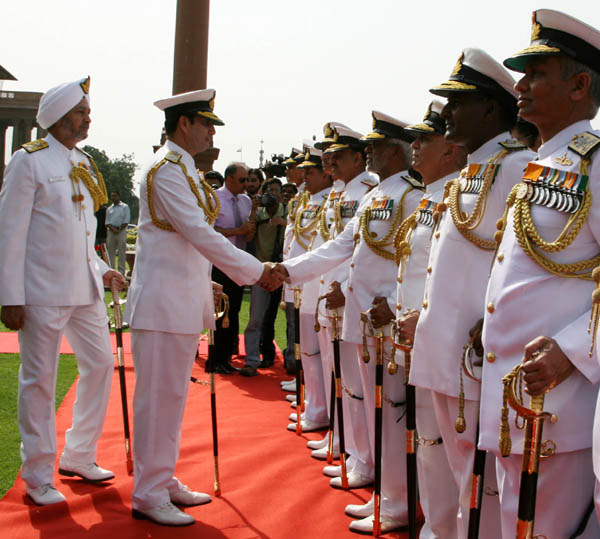|
 His
appointment was cleared by the Cabinet Committee
on Appointments (CCA) April 16, signed by the
President of India who is the Supreme Commander
of the Indian armed forces, and he was formally
informed of his appointment by the Defence Secretary
as per the established procedure. All he had to
do was to walk over to the designated office of
the CNS next door on Thursday, April 17. There
was no handing over-taking over as normally happens. His
appointment was cleared by the Cabinet Committee
on Appointments (CCA) April 16, signed by the
President of India who is the Supreme Commander
of the Indian armed forces, and he was formally
informed of his appointment by the Defence Secretary
as per the established procedure. All he had to
do was to walk over to the designated office of
the CNS next door on Thursday, April 17. There
was no handing over-taking over as normally happens.
Admiral Dhowan, fondly known as Robin from his NDA days, will hold charge for 25 months, the retirement age being 62 years for a Chief of Staff in the Indian armed forces.
Admiral DK Joshi had resigned after assuming
moral responsibility for a few accidents in the
Navy, particularly two submarine accidents in
the Western Naval Command (WNC) area. Vice Admiral
Shekhar Sinha, the Commander in Chief there and
the senior most officer of the Navy as well as
its senior most aviator, was bypassed. As Admiral
Joshi assumed responsibility over the mishaps
in the WNC, the Government found itself in a difficult
situation to select the chief of the same command
for promotion.
Vice Admiral Dhowan was the next senior most,
and he was picked up in accordance with the principle
of seniority.
He was also made the officiating Chief, as the
Vice Chief of Staff always takes over that responsibility
as and when the CNS is away from the Naval Headquarters
to another location outside the Indian capital.
That temporary assignment would not have had any
bearing in the final selection of a new CNS however.
Vice Admiral Sinha, who was otherwise due to
retire in August, submitted his resignation and
the Government conveyed its acceptance to him
on Monday, April 21. As the senior most aviator
of the Navy, he had the distinction of being designated
as the Grey Eagle. Notwithstanding the unfortunate
accidents under his watch in the Western Naval
Command, he also has had a good career and played
a significant role particularly in the development
of Indian Naval Aviation.

If Admiral Joshi had not resigned, then Admiral
Dhowan would also have retired on May 31 and there
would have been a different line of succession.
During the first day, Admiral Dhowan called on his senior counterparts,
Army Chief General Bikram Singh, who is also the Chairman of the Chiefs of Staff
Committee, and Indian Air Force Chief, Air Chief Marshal Arup Raha, paid tributes
at the Amar Jawan Jyoti (the eternal flame in memory of martyrs) and accepted
the ceremonial Guard of Honour.
Admiral Dhowan has distinguished himself in various assignments and is
a highly decorated officer with PVSM (Param Vishisht Sewa Medal), AVSM (Ati
Vishisht Sewa Medal) and YSM (Yudh Sewa Medal). He is also an honorary ADC
to the President, the Supreme Commander of the Indian armed forces.

Commissioned in the Navy on January1, 1975, he is a Navigation and
Direction specialist who has served with distinction in an array of Command,
Staff and Instructional appointments through his exemplary career spanning
40 years. He is an alumnus of the National Defence Academy (NDA), Defence
Services Staff College (DSSC) and Naval War College, Newport, Rhode Island,
USA. The Admiral had also excelled during his initial training winning the
coveted ‘Telescope’ as the Best Cadet and later the ‘Sword of Honour’ during
his Midshipman training.
Admiral Dhowan has commanded some of Indian Navy's frontline missile frigates
and warships including INS Khukri, INS Ranjit and INS Delhi and served as Chief
Staff Officer (Operations) Headquarters Western Naval Command. He has also served
as Indian Naval Adviser at the High Commission of India, London. He has commanded
the Eastern Fleet as Flag Officer Commanding Eastern Fleet (FOCEF) and also served
as Chief of Staff at Headquarters Eastern Naval Command, Visakhapatnam. He also has
the distinction of commanding the prestigious National Defence Academy, his alma mater,
as its Commandant.
Known for his professionalism and pleasant demeanor, Admiral Dhowan has keen interest
in regional and global strategic affairs and has been a regular in New Delhi's think tank
circuit, particularly at the Institute for Defence Studies and Analyses (IDSA) where he
was last seen early April during a discourse on nuclear deterrence and global No First
Use (NFU) of nuclear weapons, a policy advocated by India.
The important staff appointments held by the Admiral at Naval Headquarters
are Assistant Chief of the Naval Staff (ACNS-Policy and Plans), Deputy Chief
of Naval Staff (DCNS) and Vice Chief of Naval Staff (VCNS). These assignments
made him responsible for current and long-term modernisation of the Indian Navy.
The position of CNS now gives him an appropriate opportunity to steer and speed
up the course for future development of the Navy, particularly for the much-delayed
submarine and helicopter programmes and the emerging electronic warfare and standoff
engagement capabilities in line with regional and global capability perspective.
He is married to Mrs Minu Dhowan. They have two sons and one daughter. |